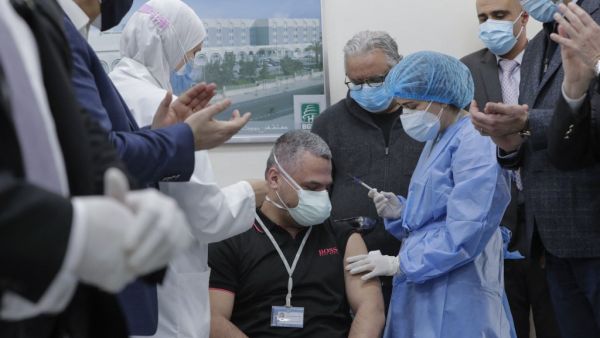Lebanon administered its first COVID-19 vaccine into the arm of a medical doctor as the country launched its inoculation drive as a key step to defeat the deadly virus.
The head of the critical care unit at Rafik Hariri University hospital, Dr. Mahmoud Hassoun, was the first person to receive the Pfizer-BioNTech jab under the watchful eyes of caretaker Prime Minister Hassan Diab and caretaker Health Minister Hamad Hasan.
Lebanon starts Covid-19 vaccination campaign https://t.co/3zCFLfKEki pic.twitter.com/3YHvlYnbCM
— FRANCE 24 (@FRANCE24) February 14, 2021
Mahmoud Hassoun, the head of the intensive care unit at the key Rafik Hariri Hospital battling coronavirus, was the first person to get the jab, an AFP correspondent said.
"Hopefully this will be the start of the end of this plague in the country," Hassoun said.
An elderly actor, 92-year-old Salah Tizani -- better known as Abu Salim --, was next to receive the vaccine as the first stage of the campaign focuses on healthcare workers and people over 75.
"I urge people not to be late to register (for the vaccine) and to get vaccinated when its their turn," Tizani told reporters. Health experts have expressed concern at the slow pace of registration with one expert saying the public were showing a sign of "vaccination hesitancy."
For his part, Diab told reporters at the hospital: "I will not be receiving the vaccine today, for today is not my turn and the priority is for the medical sector that has done its duty and presented big sacrifices."
Lebanon has received its first batch of coronavirus vaccines. The 28,500 Pfizer doses arrived Saturday, ahead of a nationwide vaccination campaign in the tiny Mediterranean country. https://t.co/cufNihv3Sr
— The Associated Press (@AP) February 13, 2021
Despite the fanfare, Lebanon is behind most regional countries in starting vaccinations, partly due to its severe financial crises and lack of laws allowing the emergency use of medications and vaccines.
In its first operation funding the purchase of COVID-19 vaccines, the World Bank reallocated $34 million from an existing health project in Lebanon to help launch the vaccination programme.
"We will MONITOR fair and transparent distribution to PRIORITY groups," Ferid Belhaj, its regional vice president, wrote in a tweet Saturday night.
The first shipment of around 28,500 vaccines had arrived in Lebanon Saturday evening. More weekly shipments from several vaccine makers are expected in coming months as authorities hope to inoculate 80 percent of the country's estimated 6 million population by the end of 2021 or early 2022.
Lebanon has been under a 24-hour curfew for a month, although the government began lifting some restrictions this week
This article has been adapted from its original source.








